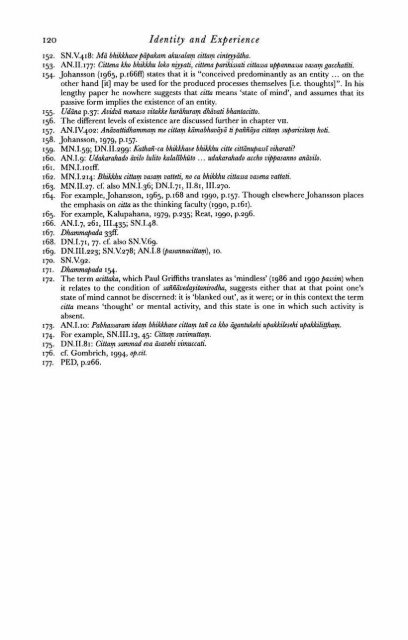Identity and Experience_Hamilton_1996
Identity and Experience_Hamilton_1996
Identity and Experience_Hamilton_1996
You also want an ePaper? Increase the reach of your titles
YUMPU automatically turns print PDFs into web optimized ePapers that Google loves.
120 <strong>Identity</strong> <strong>and</strong> <strong>Experience</strong><br />
152. SN.yq18: Mii bhikkhavepipakam akusalam cittam cinteyyitha.<br />
153. AN.11.177: Cittena kho bhikkhu loko niyyati, cittenapan'kisrati cittasra u@annasra vasam gacchatfti.<br />
154. Johansson (1965, p.166fQ states that it is "conceived predominantly as an entity . . . on the<br />
other h<strong>and</strong> [it] may be used for the produced processes themselves [i.e. thoughts]". In his<br />
lengthy paper he nowhere suggests that citta means 'state of mind', <strong>and</strong> assumes that its<br />
passive fbrm implies the existence of an entity.<br />
155. Udiina p.37: Avidvi manaso vitakke hurihuram dhvati bhantucitto.<br />
156. The different levels ofexistence are discussed further in chapter VII.<br />
157. AN.IV.402: Amivattidhammam me cittam kiimabhavciyii tipafifiaya cittay .r@arin'tum hoti.<br />
158. Johansson, 1979, p.157.<br />
159. MN.I.59; DN.II.299: Kathafi-ca bhikkhave bhikkhu citte cittinupassf viharatz?<br />
160. AN.1.g: Udakarahado ivilo lulito kalalTbhtito . . . udakarahado accho vippasanno aniivilo.<br />
161. MN.1.1orfT<br />
162. MN.1.214: Bhikkhu cittum vasam vatteti, no ca bhMu cittaua vasena vattati.<br />
163. MN.II.27. cf. also MN.I.36; DN.1.71,11.81, 111.270.<br />
164. For example, Johansson, 1965, p.168 <strong>and</strong> 1990, p.157. Though elsewhere Johansson places<br />
the emphasis on cittu as the thinking faculty (1990, p.161).<br />
165. For example, Kalupahana, 1979, p.235; Reat, 1990, p.296.<br />
166. AN.I.7, 261, 111.435; SN.1.48.<br />
167. Dhammapada 33ff.<br />
168. DN.I.71, 77. cf: also SN.V;6g.<br />
169, DN.III.223; SN.V.278; AN.I.8 (pasannacittam), 10.<br />
170. SN.V.92.<br />
171. Dhammapada 154.<br />
172. The term atittaka, which Paul Griffiths translates as 'mindless' (1986 <strong>and</strong> ~ggopassim) when<br />
it relates to the condition of safiEivedayitanirodha, suggests either that at that point one's<br />
state of' mind cannot be discerned: it is 'blanked out', as it were; or in this context the term<br />
citta means 'thought' or mental activity, <strong>and</strong> this state is one in which such activity is<br />
absent.<br />
173. AN.I.10: Pabharraram idam bhikkhave cittum tafi ca kho Ggantukehi upakkihehi upddcili{,tham.<br />
174. For example, SN.I11.13,45: Cittam suvimuttam.<br />
175. DN.11.81: Cittam sammad eva Gavehi vimuccati.<br />
176. cf, Gombrich, 1994, op.cit.<br />
177. PED, p.266.


